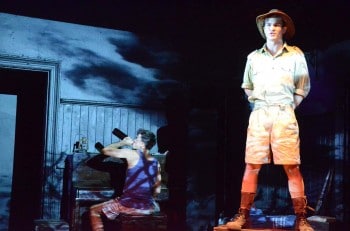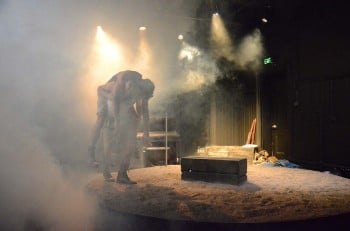Uncle Jack by Ross Lonnie: The Blue Room
Uncle Jack, Perth playwright Ross Lonnie’s latest work, saw a timely opening at The Blue Room this week, as it fell on the week leading up to ANZAC Day. This autobiographical play, directed by Soseh Yekanians, pays homage to veterans of WW11 and includes excerpts from Lonnie’s father’s wartime diary.

Image supplied
The story revolves around Doug (Ben Hall) who, after a falling out with his father, gets sent to rural WA to work at clearing a paddock for farming with a man he refers to as Uncle Jack (Quintin George). The two learn how to relate to one another as they toil under the hot sun, and Doug grows from a schoolboy unused to hard labour, into a capable young man. Uncle Jack is an alcoholic whose family has left him and has trouble putting the spectre of war behind him. He delivers life lessons in true-blue Aussie fashion through folksy language, anecdotes and traditional songs.
The action takes place on a revolving circular platform covered in dirt designed, by Patrick James Howe. The two actors turn the platform to represent the hard labour that the characters allude to and also as a device to indicate transition between scenes and locations. Helping to set the scene during the flashbacks are some old war photographs projected onto the walls of the space.

Image supplied
The script doesn’t offer much in the way of plot or dramatic conflict between the two characters – Uncle Jack doesn’t significantly change, grow or learn anything new throughout the piece – any dramatic arc is reserved for the character of Doug. Jack is given strong, vivid life by Quintin George and stands in nice contrast to the softer character portrayed by Ben Hall. The two build a genuine rapport through the course of the performance.
The flashback excerpts from the wartime diary are important to the playwright’s personal journey in writing the play, but they tend to disrupt the show’s continuity and add confusion to this simple story. I suspect this show will resonate most with audience members who have had personal experiences with returning soldiers, and who will be able to share in its nostalgic treatment of a by-gone era.
